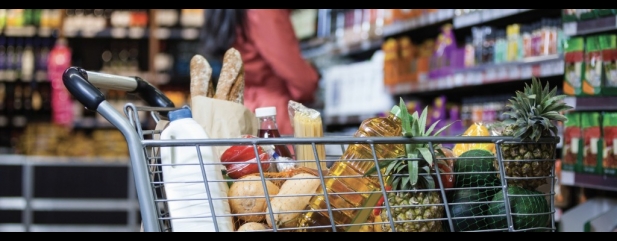Archived article
Please note that tax, investment, pension and ISA rules can change and the information and any views contained in this article may now be inaccurate.
Load up on Tesco shares as stockpiling boosts sales

In the midst of panic selling of consumer discretionary stocks, the supermarket sector has been remarkably resilient as investors come to appreciate that whatever else is going wrong in the world, we all still have to eat.
While pubs, restaurants, hotels and cinemas have seen a sharp fall in customers, supermarkets have been inundated as shoppers rush to fill their cupboards with dried pasta, UHT milk and loo roll.
As the market leader with extensive supply chains, in our view Tesco (TSCO) is best placed not only to cope with sudden surges in demand but also to see off the threat of the discounters with their very limited assortment of goods.
Since the acquisition of Booker in late 2017, Tesco has seen a steady increase in sales and margins helped by a focus on more profitable lines, a simplification of the business and a greater emphasis on capital discipline.
Earlier this year it agreed the sale of its Thai and Malaysian operations for c£8bn, equivalent to 12.5 times earnings before interest, tax, depreciation and amortisation (EBITDA), above analysts’ forecasts. There is also speculation that it is readying the sale of its Polish subsidiary, to free up further resources.
Shareholders will get £5bn of the sale proceeds to be shared as a special dividend while £2.5bn is going into Tesco’s pension scheme to eliminate the current shortfall. The firm estimates it will see a free cash flow benefit of £260m a year from 2021 as a result.
Capital spending on its stores is expected to fall from the recent range of £1.1bn to £1.4bn, to £900m to £1.2bn, which will further improve profits and shareholder returns, while leverage is set to remain modest.
Grocery spending has been rising steadily for the past six months, with a notable acceleration since the general election as volumes and prices both show an increase.
While footfall on the high street and at retail parks fell in February due to the combination of coronavirus and three big storms, all of which arrived over a weekend, shoppers continued to stock up at supermarkets despite there being fewer promotional deals.
Tesco’s ‘owned brands’ – newly-created ‘heritage’ ranges like Boswell Farms and Creamfields Dairy – are increasingly popular with consumers who are looking for quality as well as value.
It is also expanding further in the ‘food-to-go’ logistics market with the acquisition of Best Food which services Burger King, KFC and Pret a Manger and generates £1.1bn a year in turnover.
Important information:
These articles are provided by Shares magazine which is published by AJ Bell Media, a part of AJ Bell. Shares is not written by AJ Bell.
Shares is provided for your general information and use and is not a personal recommendation to invest. It is not intended to be relied upon by you in making or not making any investment decisions. The investments referred to in these articles will not be suitable for all investors. If in doubt please seek appropriate independent financial advice.
Investors acting on the information in these articles do so at their own risk and AJ Bell Media and its staff do not accept liability for losses suffered by investors as a result of their investment decisions.
 magazine
magazine









